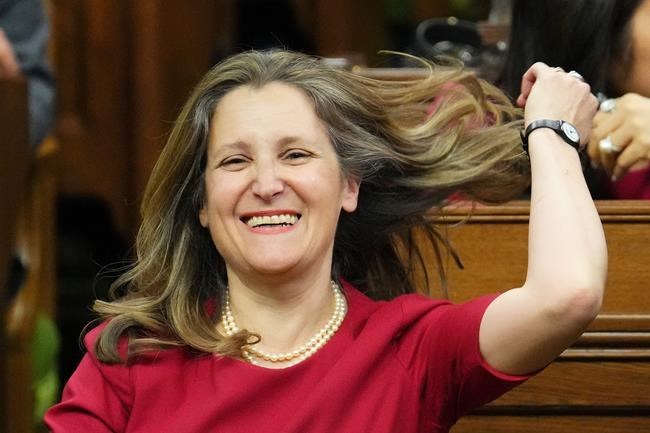OTTAWA — Finance Minister Chrystia Freeland's 2023 federal budget promises "transformative investments" in Canada's green economy as the country tries to maintain its place in the global clean tech revolution and realign its supply chains toward allies who won't use energy as a political weapon.
"Together these two great shifts represent the most significant opportunity for Canadian workers in the lifetime of anyone here today," Freeland said Tuesday in the House of Commons, according to her prepared remarks.
The budget promises to add more than $8 billion in new program spending in the coming fiscal year with a deficit of $40 billion.
Over the next five years the government expects to spend $60 billion more than before, almost half of it to increase health transfers to the provinces and territories and further expand the national dental-care program the Liberals are creating as part of their deal with the New Democrats.
Dental care is expected to cost more than $13 billion over the next five years, about a $7-billion increase from what the government said it would cost when it was introduced in last year's budget.
Dental care was one of the NDP's key asks from the Liberals when the opposition party entered into a confidence-and-supply agreement in March 2022 to back the minority government on key confidence votes, such as budgets, through to 2025.
More than one-third of new spending is for investments in clean-tech industries, mostly investment tax credits to drive the private sector in clean electricity, hydrogen production, critical minerals, and the electric-vehicle supply chain.
Over the next 12 years, the government expects to spend more than $80 billion on investment tax credits for clean technology and renewable energy, hoping to draw in much more than that from the private sector.
"The scale of the required investment is massive," the budget said.
Almost one-third of the investment tax credits will be for clean power, including finally aiming to connect Canada from coast to coast with power lines.
Freeland's budget also gives a nod to the anxiety many families are feeling from inflation, adding another top-up to GST rebate cheques for lower-income families this spring.
Inflation is falling after hitting near record levels last summer, but will remain above the Bank of Canada' two per cent target until at least the second quarter of 2024, the budget predicts.
The increase in grocery prices is proving especially tough to slow, hitting close to 11 per cent in February compared to a year earlier.
"We all know that our most vulnerable friends and neighbours are still feeling the bite of higher prices," Freeland said in her speech.
The GST top-up will be the same as what was offered last fall, up to $467 more for a family of four. Between the two top-ups, GST payments over 12 months will be double what people expected them to be last July.
All the new spending, and a $17-billion increase in the cost of interest on government debt over five years, has eliminated Freeland's hope for a balanced budget on the horizon.
In November, she forecast a $4.5 billion surplus by 2027-28. Tuesday's budget says the books will be in the red at least until that year, with a $14 billion deficit projected for year five.
Freeland is promising to find $15 billion in savings over five years by scaling back government travel, its use of outside consultants and asking most federal departments to cut their spending three per cent.
Freeland uses positive language to describe Canada's current economic situation, but the budget makes clear the upheaval created by the pandemic means the country is still at risk of seeing its finances take a turn for the worse by the end of this year.
Freeland's claims of keeping cash outflows tight aside, Mostafa Askari, the chief economist at the Institute of Fiscal Studies and Democracy at the University of Ottawa, said his first takeaway from the budget was simple.
"There is a lot of spending," he said.
He is wary of the government being able to find $15 billion in savings, particularly given that the promises are vague, with no specific understanding of what money will not be spent.
"Every government, every budget has had some efficiency game," said Askari. "It's very unlikely they're going to get these savings."
Askari also said there are significant risks of an economic downturn later this year, which could upend all of Freeland's economic assumptions, lowering government revenues and making the deficit even bigger.
This report by The Canadian Press was first published March 28, 2023.
This report by The Canadian Press was first published March 28, 2023.
Mia Rabson, The Canadian Press



